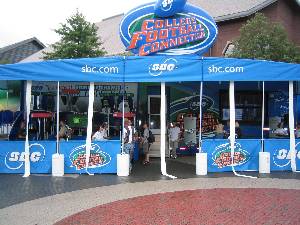News
Temporary events, long-lasting profits
July 21, 2005
Advertising is changing. As devices like TiVo allow consumers to shift past television commercials, advertisers must find new ways to get their products in front of people.
"Traditional advertising is being thrown out the window," said Rick Segel, retail consultant and author of "Retail Business Kit for Dummies." "So where does the advertiser promote? Now, it's becoming more and more events (oriented) all the time. Sponsorship is becoming a huge thing - you're pinpointing a specific customer that has a particular psychographic and a particular lifestyle."
 This story and all the great free content on KioskMarketplace is supported by: Request free info from this company!  |
"Who cares how old they are and how much money they have?" he asked. "It's what they like, what they want, that matters. Everyone has their black hole - the one thing that we love so much, we don't care what it costs us, we're going to spend money on it."
That focus on specific customers with specific interests is driving the trend of so-called pop-up retail - event-driven opportunities to put products and services in front of customers.
"People are shopping differently today," said Brian Ardinger, vice president of business development for Lincoln, Neb.-based kiosk software developer Nanonation. "There is more information, more competition and more ways to interact with companies than ever before. Companies are looking for ways to stand out and differentiate themselves."
During
 |
Event sponsorship allows retailers to promote to specific customers with specific interests. |
Every retailer, every industry
Before now, such events might have seemed extravagant, but Segel says they're becoming essential.
He explained that every retail business can benefit from event marketing of this sort, and that it doesn't have to be a huge event. For example, home supply stores can host classes on how to install tile. One of his clients, a bridal store, offered a class on being the perfect mother-in-law.
"When you have events like this, you're narrowing the timeframe where you're selling stuff," Segel said. "You can sell tons of stuff in a short period of time."
Whether the event is big or small, Segel said that having a high-tech component like a kiosk is invaluable.
"You're incorporating the fun factor into retailing," he said. "It is the machine that is becoming the anchor, the focal point to bring you in. The technology is more than utilitarian."
And if by chance your event is a big one, the kiosk becomes even more important.
"When you're sponsoring something like a race, there might be 50 other sponsors there. That's why using something like a kiosk can be so great - it can be a great differentiator."











